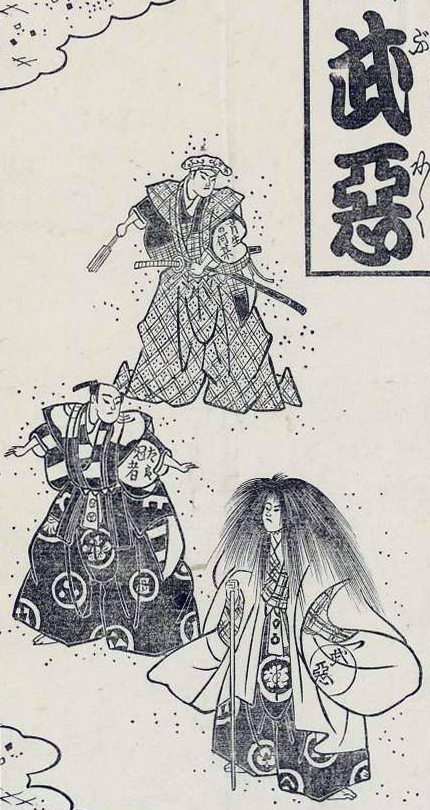| BUAKU |
| Play title | Buaku |
| Authors | Takeshiba Shinkichi (lyrics) Kishizawa Koshikibu VII (music) |
| History |
The Kabuki adaptation of the ky˘gen "Buaku" was premiered in October 1904 at the T˘ky˘za [casting]. |
| Key words |
Buaku Daimy˘ Enma Dai˘ Gidayű Kannon Kiyomizudera Ky˘gen Omodaka Jűshu Shosagoto Tokiwazu Toribeyama |
| Summary |
Buaku is a servant of the daimy˘ Seriu but he is not a very good servant, seldom appearing for duty. His constant absence finally drives Seriu angry to the point where he orders Buaku's colleague Sh˘go to find Buaku and behead him for neglecting his duties. Sh˘go tries to protest for his friend's sake that Buaku is ill, but Seriu refuses to listen to his pleas and threatens Sh˘go with dismissal if he refuses to comply with his orders. The unfortunate Sh˘go sets off on his unhappy errand on a balmy spring day and finds Buaku loafing pleasantly at home. Not wanting to tell Buaku that he has been sent to kill him, Sh˘go says that the lord is having guests so it might be a good idea if Buaku would catch some fresh fish to his master. This might make a favorable opportunity for Buaku to ask for his forgiveness. Buaku is grateful to his friend for his thoughtful suggestion. Then he sets off with his fishing rod, accompanied by Sh˘go. Sh˘go makes attempts along the way to draw his sword and strike Buaku, but is foiled at each clumsy try, largely because he is unwilling to kill his friend. Finally they arrive at the fishing site, and Sh˘go draws his sword again. By now, Buaku has become aware of his friend's real intention, and says it would be better if Sh˘go were to tell him the truth instead of trying to cowardly stab him in the back. So Sh˘go tells the truth to Buaku, who says that he will take his punishment. Then he requests that Sh˘go kill him as ordered. Sh˘go swings up the sword when Buaku closes his eyes and seems to be in prayer. Wetting his sleeves with tears, Sh˘go has lost the will to behead his friend. He tells Buaku to go to a distant place and not show himself in the vicinity again. Sh˘go will return to the lord and lie to him, telling him that he has beheaded Buaku as ordered. Buaku thanks his friend for sparing his life. The friends part in tears. Sh˘go returns to his master's mansion and reports that he has done as ordered. But now Seriu, on hearing how gallantly Buaku has met his death, begins to regret his hasty decision to punish the lazy servant by death. He decides, as an act of atonement, to make a pilgrimage to the Kiyomizu Temple in Ky˘to to offer a prayer to the Goddess Kannon for the repose of the soul of the dead man. Sh˘go accompanies him on the trip, along with another servant named Kur˘ji. But on the way to the temple they bump into Buaku who is heading for the same destination to offer a prayer to thank the Goddess Kannon for having been spared. Sh˘go is astonished to see his friend and hastily warns him to be off before he is seen by the master. Buaku tries to hide his face but Seriu has already seen him and is quite suspicious. Sh˘go desperately insists that he has really killed Buaku. Finally, Sh˘go has an inspiration and shouts that it must by Buaku's ghost, because the site is very near to the burial site of Mount Toribe [1]. Not even Seriu is brave enough to face a ghost. When Buaku comes forward acting like a ghost, both Seriu and Kur˘ji get frightened out. Buaku immediately takes advantage of the situation. He tells the frightened lord that he has met Seriu's father in the afterlife and that the dead man has given him some message for his son. The deceased daimy˘ has said that he is molested by highwaymen in the afterlife and he would like to have his son present him with a sword for self-protection. Buaku proposes to bring the sword to him, and asks that Seriu hand his sword over. Seriu does so in fright. Then Buaku presses his advantage further, saying that the deceased father has also said that he would like to have a formal set of garments to wear to the daily audience with Enma Dai˘, the king of the netherworld. Again Seriu complies, taking off his own outer garments and handing it to Buaku. Then Buaku on request starts to describe some aspects of the afterlife. But in his enthusiasm he forgets himself and in spite of Sh˘go's attempts to warn him within, his pretense starts to fall away. Seriu begins to suspect that this is not a ghost but Buaku in flesh and blood. Furthermore, Kur˘ji notices that this ghost has feet [2]! . Thus Buaku is exposed, and is forced to run away with Seriu chasing angrily after him. |
| Notes |
[1] A cursed place where dead souls are said to wander. [2] Ghosts in Japan do not have legs. They just float in the air! |
 |
|
"Buaku" in October 1904 at the T˘ky˘za |
|
|
| Contact | Main | Top | Updates | Actors | Plays | Playwrights | Programs | Links | FAQ | Glossary | Chronology | Illustrations | Prints | Characters | Derivatives | Theaters | Coming soon | News |